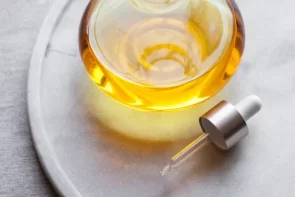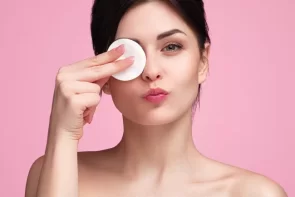Providing Dry Skin With Moisture - This Is How, According To Experts, The Right Care Is Possible Inside
Dehydration of the skin can cause irritation and inflammation. Find out here how, according to the experts, you should moisturize your skin inside.
Dry skin is an issue that concerns many of us right now. On a recent visit to Dr. Barbara Sturm in London quickly diagnosed Heena, the therapist who took care of my skin during a facial, with a case of dehydration. A somewhat embarrassing situation for a beauty editor, but she pointed out that I was not alone in this. Dehydration is the problem for most of the customers who pour through the doors of the salon, according to Heena.
Facial care for more moisture - the news
Recent consumer studies show that searches for "moisturizing skincare" are up to 86 percent compared to last year. "Dehydrated skin is skin that is water-deficient or less able to hold water. It can feel tight and dry, and in more severe cases, it can cause flaking and irritation," says Dr. Ifeoma Ejikeme, general practitioner and expert in aesthetic medicine. Many of us know from personal experience that dry skin often looks dull and sallow and that fine lines can be more prominent. This immediately destroys any hint of luminosity - in a devastating way.
Aside from the luminosity factor, Pamela Marshall, clinical aesthetist and co-founder of Mortar & Milk, says it is important for the skin to be well hydrated and hydrated because it makes it less likely to have inflammation such as acne or redness. "Dehydrated skin sends messages to the sebum glands to produce more sebum," she explains. "This excess sebum can cause inflammation. The capillary network also expands when the skin is dehydrated [leading to increased redness]." However, if you provide the skin with sufficient moisture, these symptoms of inflammation will calm down.
But how? Here you will find the expert tips that you need to supply your skin with sufficient moisture and protect it from dehydration.
Everything starts with nutrition
Unsurprisingly, drinking water is high on the list when it comes to hydrating the skin, but it's also important to combine it with a healthy dose of essential fatty acids. "Inside, our skin is both hydrophilic [tends to mix with water] and lipophilic [being attracted to lipids], which means we need both water and lipids to keep it hydrated," says Marshall. "Foods like nuts, seeds, avocados, and oily fish can have positive effects on the overall moisture levels of the skin, as well as the dermal levels." She also advises taking an omega dietary supplement. We love Perricone MD's omega supplements.
Pay attention to the ingredients of your products
"For truly hydrated skin, we need to pay special attention to the ingredients that could cause dehydration (or transepidermal water loss). You can use any moisturizer in the world, but if you overuse ingredients like Alpha Hydroxy Acids (AHAs), you will always suffer the effects of dehydration, "says Marshall. While active ingredients like acids and retinol are brilliant ingredients that can do wonders on your skin, Marshall says most consumers: don't yet know how to use them properly. "Active ingredients are like a piece of cake - great to use every now and then, but when used daily they can destroy skin health. It's about finding a balance between active ingredients, antioxidants, and protectors."
She's a big fan of incorporating polyhydroxy acids (or PHAs) into facial care, as they do everything an AHA does - from exfoliating to smoothing - in ways that are good for the skin over the long term. Because they are higher in molecular weight than AHAs, they don't irritate the skin and help reduce inflammation while exfoliating at the same time. They also act as antioxidants and humectants that help protect the skin and keep moisture in the skin.
In the meantime, Dr. Ejikeme to listen to the signals from your own skin. If she feels dehydrated or particularly irritated, stop peeling, or at least reduce it drastically, and use ingredients that help reduce transepidermal water loss by strengthening the skin's barrier (like with niacinamide) as they aid in collagen production and the skin's barrier function can. Also, make sure that you use a gentle cleanser to cleanse the skin, not products that are too intense.
Fill your skincare routine with moisturizers
While hyaluronic acid is the ingredient that everyone - rightly - raves about for its moisturizing properties (it is known to absorb a thousand times its own weight in water), there are other moisture heroes to look out for on the care product labels. "Glycerine is the skin's natural moisturizing factor," says Dr. Ejikeme. "It's inexpensive, but we rarely hear about it because it's overshadowed by the popular hyaluronic acid." Found in a number of great products, glycerin, as a smaller molecule, has the ability to penetrate much deeper into the skin than hyaluronic acid and also helps prevent irritation. It can be used on all skin types and is non-comedogenic, so oily and acne-prone skin can also benefit from its benefits.
Dr. Ejikeme also highlights other moisturizers to incorporate into your beauty routine, including hyaluronic acid, panthenol, and aloe vera. "Ingredients like ceramides, sphingosine, and fatty acids also help lock in moisture," she says. Serums are the go-to tool when it comes to nourishing the skin with moisturizing ingredients, while moisturizers act as a "protective blanket" and encapsulate the ingredients, also protecting the skin from drying out.
As with all skincare products, according to Marshall, consistency and long-term use are key to seeing results. "With topical products, we need to be aware that most of them target the outer layer (or stratum corneum) of the skin, which is made up of mature or dead cells," she says. "This means that most of the products we use only initially act on the outer layer, which in the short term has no effect on the functionality of the skin." In the long term, however, it still has a positive effect.
During my facial, Heena provided me with hyaluronic acid and I left her with strict instructions to keep using it so that my skin retains the juicy glow that I used to see in Dr. Barbara Sturm left that day. And guess what? Together with a gentler beauty routine, it has already worked.
Comments















